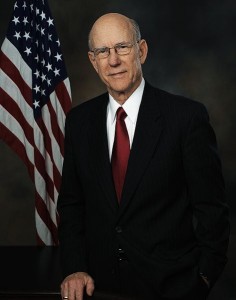Kansas primary reflects growing anti-incumbency sentiment

THIN MARGIN: U.S. Sen. Pat Roberts narrowly defeated Tea Party challenger Milton Wolf by seven points during Tuesday’s primary election.
By Travis Perry │ Kansas Watchdog
OSAWATOMIE, Kan. — Just call Tuesdays’ primary election the revolution that wasn’t.
“It was an almost revolution,” said Chapman Rackaway, political science professor at Fort Hays State University. “We had a threat of an earthquake, even if the ground didn’t quite shake.”
For incumbent politicians in the Sunflower State, this week’s primary races flirted with upheaval. While the vast majority of office holders won the day, political observers say it could foreshadow voter trends in coming years.
Rackaway and Washburn University political science professor Bob Beatty say unofficial primary tallies suggest a wave of anti-incumbency sentiment sweeping across Kansas, despite the relative success of current officeholders.
“You didn’t see any candidate pull more than 69 percent, and that was Lynn Jenkins,” Rackaway told Kansas Watchdog. “Even the governor, coming down with a really anemic 63 percent, and then (Milton) Wolf who ran a real one note campaign coming within seven points of (Pat) Roberts, it just kind of screams anti-incumbency as a general trend.”
“If I’m an incumbent, I’m taking this very seriously and say I’m taking a charm offensive with my own voters,” he added.
Beatty referenced several recent polls conducted by Survey USA, suggesting a chunk of Kansas Republicans are leaning away from the governor’s bid for re-election.
“I think it’s real. I think it’s about one-third of Republicans who are considering not voting for Brownback,” Beatty said.
For Brownback, this will likely translate into a dead sprint toward November rather than the more relaxed campaign voters might have seen had challenger Jennifer Winn not snagged 37 percent of the gubernatorial primary vote.
“The governor knows that he has got a real fight on his hands,” Rackaway said. “Had he sailed, he would have quietly raised money for an all-out campaign in the fall. For him that begins now, and it must begin now if the governor has any hope of holding onto Cedar Crest he absolutely has to start defining Paul Davis before Davis defines himself.”
While most Republican victors are expected to outpace their Democratic challengers in November’s general election, it’s still too early to predict the makeup of the Kansas Legislature come January and the next legislative session. While tea party statehouse candidates rode into office atop a wave of voter approval in 2012, two years later the movement has had a few false starts.
“The reports of its demise are certainly exaggerated, but none of the elements of the tea party represented here in Kansas had that great of a night (Tuesday),” Rackaway said.
Focusing on the tea party’s statewide influence, Beatty argued the conservative movement is still strong in Kansas, but “they don’t seem to be strong enough to just get over the top” and seize control of a congressional seat.
Ultimately, Rackaway predicts the Kansas House and Senate won’t look all that different when state lawmakers reconvene in 2015 and begin the arduous task of working through the state’s next biannual budget. The real impact on policy will be determined by whoever is bound for the governor’s mansion after November.
“It’s going to be a toss-up in the governor’s race, and what Gov. Brownback would ask for in the Legislature would be drastically different from what a Gov. Davis would ask for,” he said.
Like Watchdog.org? Click HERE to get breaking news alerts in YOUR state!







